How is Rafa so mentally tough?
What makes John Isner so good in tiebreakers?
How can you study their mental toughness in tennis matches and apply it to your own mental game?
Today, I’m going to explain to you why most advice on mental toughness and pressure in tennis is a myth, and how you should start thinking about mental toughness. Then, I’ll give you tips you can actually use to improve your own tennis mindset so you can play better tennis under pressure.
The Truth About Pressure In Tennis
Recently during the US Open, I heard the announcers talking about how certain players handle pressure. They were saying something like, Djokovic just handles the pressure so much better than his opponents. Chrissy Evert especially does this with Serena Williams and other top female players.
But what is this pressure thing? And is it true that certain players handle it better, or is it a story we tell ourselves?
We all feel pressure in our tennis matches. Just recently I was in a 10 point tiebreaker and double faulted at 9-8. Fortunately, we won the match anyways 🙂
Pressure is that feeling we get in those tight matches, the nerves.
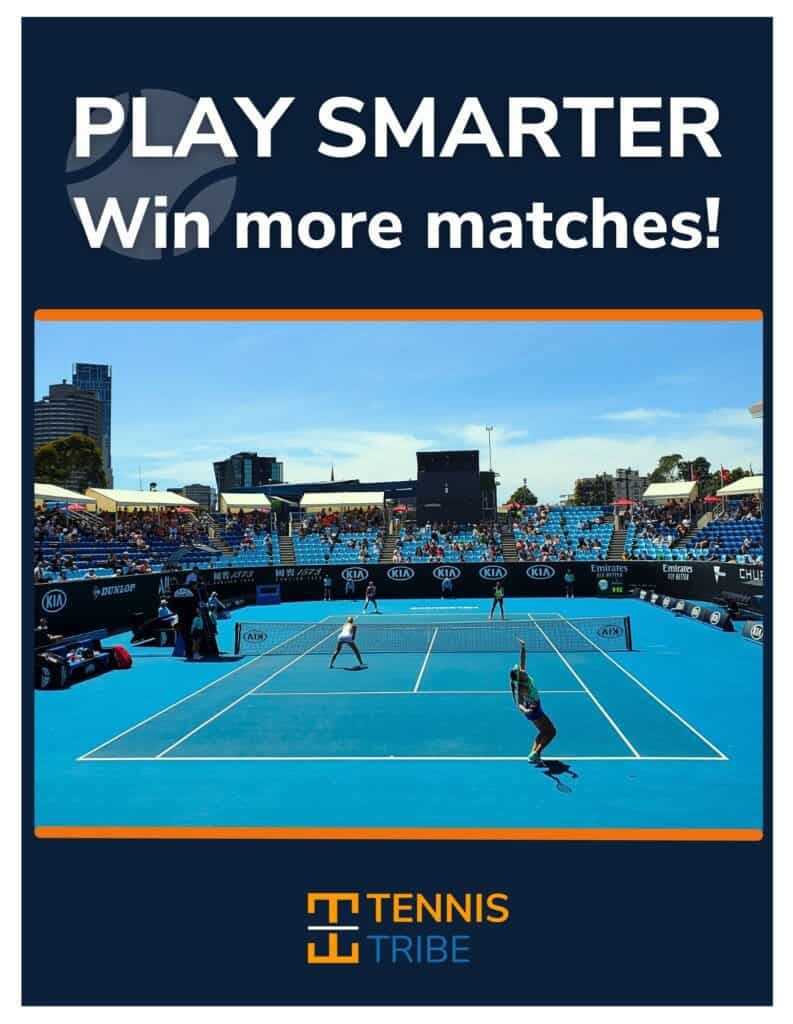
Win matches easier & improve faster with better, smarter tactics.
Learn Doubles from a Top 10 ATP & WTA Strategy Analyst
How We Know Who is Mentally Tough
So how does someone like Nadal continue to crush the ball and go for big forehands on pressure points? How is he so good under pressure?
First, we need to decide if it’s objectively true that he is good under pressure.
To really answer this, we need to:
- Define what a pressure point is.
- Find what percentage of points Nadal wins on pressure points.
- Find what percentage of points Nadal wins on non-pressure points.
- Compare the difference to that of other players.
If Nadal is “mentally tough” and handles pressure well, then his percentage of points won would increase, stay the same, or at least not drop as much as other players on those same pressure points.
For example, take a look at this fake table I made, with fake numbers.
| Non-Pressure Points | Pressure Points | |
| Nadal | 59% | 58% |
| Isner | 55% | 51% |
In this chart, even though Nadal’s percentage of points won drops by 1%, he handles pressure better than Isner, because Isner’s level drops by 4%.
Why The Best Tennis Players Play Better Under Pressure
Let’s define pressure points as tiebreakers to make it easy.
When we look at the data, this is mostly negligible in tennis. In this analysis by Jeff Sackman, he finds that “a player’s performance in non-tiebreak situations did a very good job of predicting his chances of winning tiebreaks.”
Players who win a higher percentage of tiebreak points are players who win a high percentage of all point because…
they’re just better players!!
This idea of handling pressure well and mental toughness in tennis is mostly arbitrary and made up by people to explain players who are really good.
To use another example, let’s look at basketball.
People always called Kobe Bryant clutch but when you look at the data, he actually shot a worse percentage at the end of close games. This is because the Lakers always called isolation plays in the last few minutes of close games. Isolation plays decrease your odds of scoring when compared to running an actual play.
So, it turns out that while we do all feel pressure, the idea that some players handle it better, or are mentally tougher, is simply not true.
Okay, that makes sense, but what about that nervous feeling?
I did say that I double-faulted on a pressure point last week. Surely, that’s not a coincidence.
Tennis Players Who Don’t Feel Pressure, Explained
Not trying to pick on Chrissy, but she does this more than the other tennis announcers.
Serena is playing a big point and rips a down the line backhand winner. Then Chrissy says “Her mental game is so good. She simply doesn’t feel the pressure.”
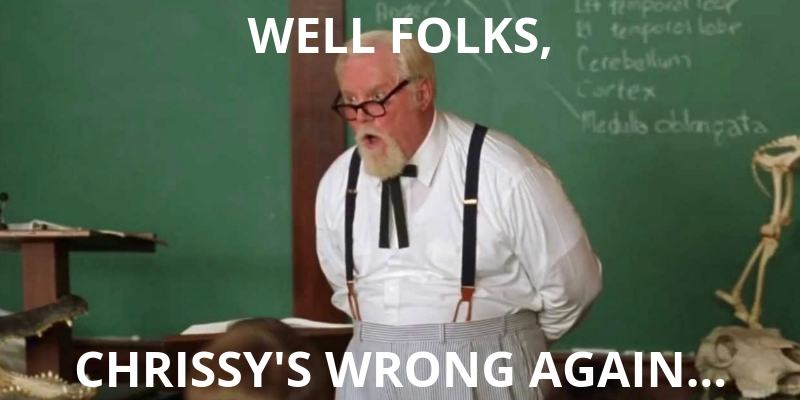
How You and Roger Federer are the Same
Dance with the fear. – Seth Godin
One of my favorite writers, Seth Godin, has a saying… “Dance with the fear.”
The idea is that people don’t overcome fear like society tells us they do. Instead, we must accept it and learn to dance with it. Act despite the fear, and pressure of the moment.
When announcers like Chrissie say things like “she just isn’t feeling the pressure right now,” I cringe.
It not only isn’t true, but it has us place tennis players like Federer on a pedestal as if they just have some God-given, non-human, mindset or mental toughness.
All players, from me to you to Federer, feel the pressure. What’s important is how we choose to act with it.
Free Weekly Doubles Lessons
Join the #1 Doubles Strategy Newsletter and get my Net Play Guide: 3 Doubles Tactics to Force Errors & Get More Easy Volleys for free!
– Will Boucek, ATP & WTA doubles strategy analyst
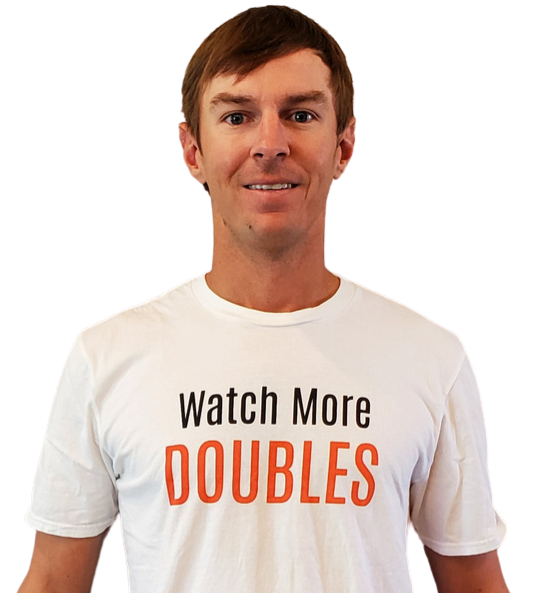
“I found your site a couple weeks ago and used your guide for net play. It worked well! Playing again this morning so we will see how it goes!”
– Julie, Club Doubles Player
Mental Toughness Tips During Tennis Matches
Here are a few tips that can help you play with the pressure in tennis, because it’s not going away 🙂
Move More
In tiebreakers, one strategy I’ve found to work for me is to move more. If you’re at the net, move around between shots to distract the opponent and make them feel the pressure.
I’ll also try to serve and volley when I’m feeling nervous. It makes me get forward on my serve and keeps me from having time to think about my next shot. If I’m nervous and have a slow groundstroke, I’ll often miss because I had so much time to think about it. I rarely miss a volley because of nerves though.
Appreciate the Moment
Another strategy for dealing with pressure that’s worked for me is looking around at the other courts. Some people might not like this and tell me to focus on my own match, but it’s had a positive effect on me.
I think I play my best tennis when I’m having fun. If I can look around and say something to myself like “this is so much fun being able to play tennis on a beautiful day like this,” it will help me appreciate the moment, see the bigger picture, and not worry about the pressure.
I know it’s cliche, but no one is going to remember that I double-faulted to lose a 4.5 doubles match at my 60th birthday, or even a year from now.
Who cares?!
Breathe
People for some reason stop breathing during pressure moments. It helps to consciously breathe because, well, we need air to function correctly.
I like to jump around a little bit and breath, but some people close their eyes and do a meditation type breathing. There’s not one right way to do it, just try different breathing methods out and see which you like best.
Training Tips to Improve Your Mental Toughness
I want to leave you with some action items for performing under pressure in tennis. You can go out and actually practice these drills to improve your mental game. There’s nothing that will replicate the real pressure of a 10 point tiebreaker that you have to win to go to nationals, but these ideas may help.
Bet with Sprints, Money, or Beer
In practice, there’s really no way to replicate the pressure of a real match situation. But you can try setting stakes on your practice matches. If you’re playing a doubles practice match, bet on it. The loser has to do sprints or pushups.
If you want to have more fun, have the loser buy beers, drinks or dinner after. Even better, the losing team has to do something embarrassing, like wear a slightly humiliating outfit to the next match.
Examples can be found in this picture of my college team after playing Halloween doubles 😛
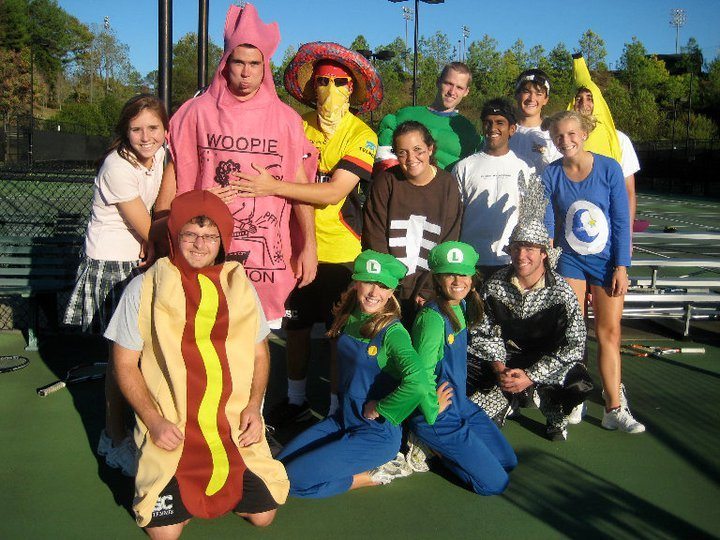
The point is to create a situation where the match matters so you can make it as close to a league or tournament match situation as possible.
Practice! Practice! Practice!
You learned earlier, that the tennis players who perform better under pressure, are simply the better tennis players. So, by simply practicing more and improving your tennis game, you will become mentally tougher.
For example, let’s say I’m playing against a 3.5 player in 1 ten point tiebreaker for $1,000. I’ll probably win because I’m a better player than a 3.5.
Then the tv announcers might say, “Will just handled the pressure better in that tiebreaker.” But, it’s not true. I’m just better because all the hours of tennis practice in my life have helped me become a 4.5 level player.
MOST POPULAR COURSE!
25 Winning Doubles Tactics
Guaranteed to help you play smarter & win more matches.
- Over 50 video doubles lessons
- 60+ ATP & WTA points analyzed
- Nearly 3 hours of strategy content
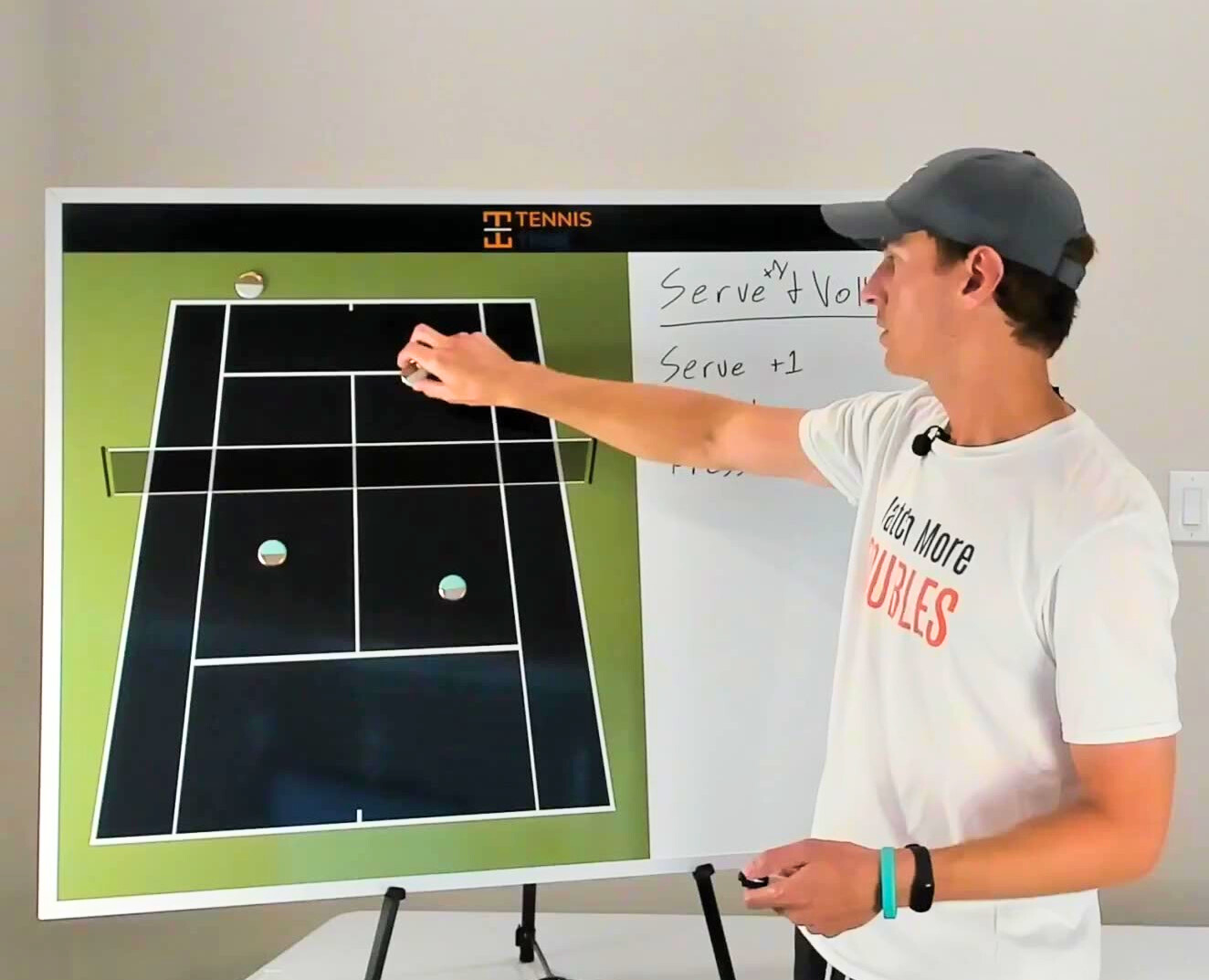
Will Boucek – Doubles Strategy Analyst for ATP & WTA Players and Team USA at the 2024 Olympics
Practice Like You Play
An important element to your tennis practice or training is to make sure it’s close to a real match situation. If you go out and practice without intensity, it won’t help you during the close matches. You have to practice those exact shots that you’ll be hitting in pressure situations with the same match speed, mindset, and effort.
Practice 10 point tiebreakers, fast-paced groundstrokes, and volleys that you actually hit in matches. Make sure you focus on this or practice alone won’t help.
3 Takeaways for Keeping Calm Under Pressure
This has been a lot of information on dealing with pressure in tennis and improving our mental toughness. There are a few key takeaways I hope you’ll keep with you. Try writing these down and keeping a list in your tennis bag to remind yourself how to keep calm and play your best tennis.
- Mental toughness is directly related to your skill level in tennis, not your ability to handle pressure.
- During close tennis matches, move, breath, and appreciate the moment.
- Practice like you play!
What else do you do during matches or tennis practice to help improve your ability to handle pressure?? Comment below 🙂
If you like this doubles lesson… then you’ll love my new doubles course, The Mental Game Masterclass. It includes a 30-day money back guarantee.
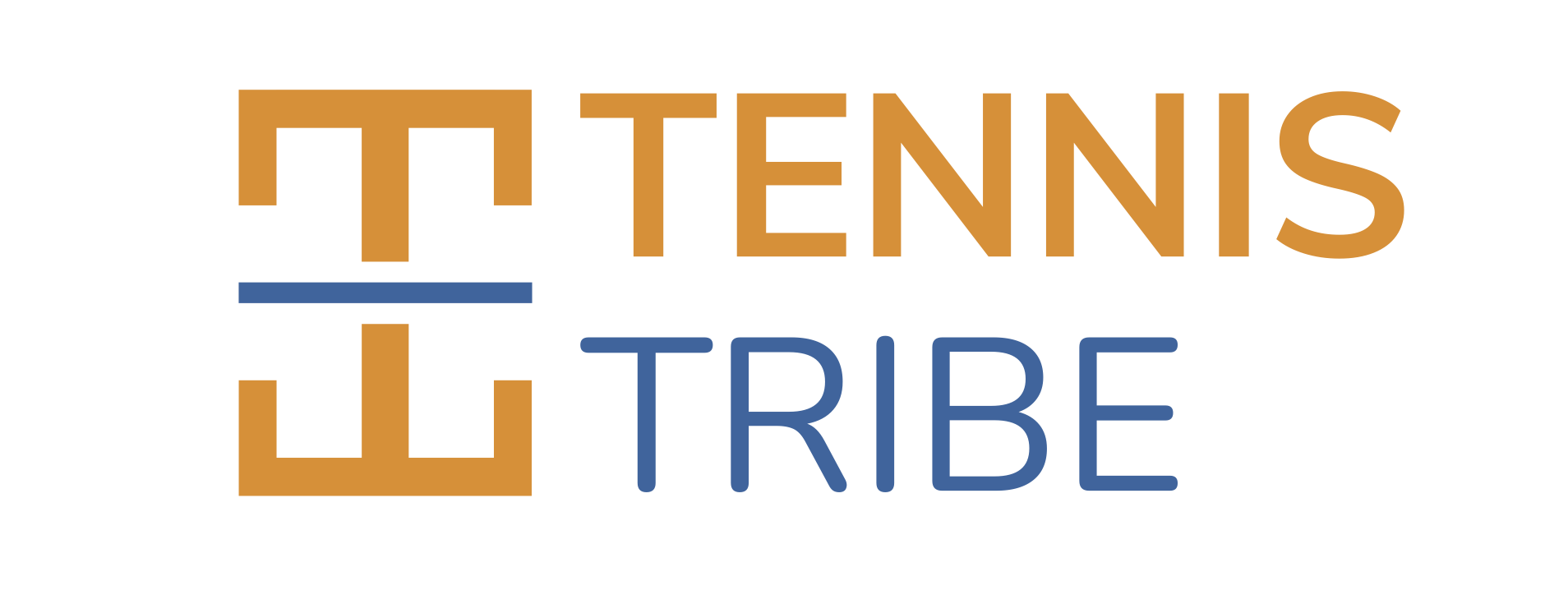
I really enjoyed this article. Mental toughness is something I really work at. I incorporate most of the strategies you have listed especially the breathing (which I often have to remind myself to do). Another one I use is focus on the ball. I let everything disappear around me but the ball. Most of the pressure comes from people – opponents, partners, teammates, spectators. If I just play the ball, I feel more calm. Thanks for sharing Will. Looking forward to your next one!
Thanks Summer! I really like that suggestion of focusing on the ball too. I’m going to start using that one as well 😉
Thanks Will! This article was entertaining and VERY helpful. I will put the 3 takeaways into immediate use, especially to apply pressure to myself while practicing. I will also add a tip that I have learned as I have returned to tennis in hopes that it may help others…only the next point matters. When you are down in the game, just made a mistake or you are in a high pressure situation, it does not matter. Only the next point matters. Even if you are down 1-9 in a 10 point tiebreak, play each point to the best of your ability and make the other team beat you…don’t beat yourself. When I apply this effectively I usually find myself crawling out of any hole I *think* I’m in.
Thanks Tiffany!
Yep, I totally agree. Always during a tennis match, you have to take it one point at a time. But especially in pressure situations like tiebreakers 🙂
Disagree. Performance anxiety exists, and can ruin people’s game. People who deal better with pressure are better than us at that, and therefore “don’t feel pressure.” I seriously doubt if you’ve ever felt the ‘fight or flight” response at tennis.
Hey Bill, thanks for the comment.
My point wasn’t that performance anxiety doesn’t exist… just that it affects everyone just about the same.
The data from Tennis Abstract’s post is proof of that. Nadal, Federer, & Isner win points during tiebreakers at about the same rate that they do during non-tiebreak situations.
I’ve definitely double faulted in a pressure moment. But so has Federer, Serena, and everyone else 😉
Hi Will! Really great article for players at any level. I am reading this article in 2023 even though it’s published a long time ago. I am currently facing this problem which stops me from playing my best level on the court. In my opinion I am a really great player, I practice everyday, both in the morning and evening, I have even physical training. But what I lack the most is the “mental toughness”. And when you say that mental toughness is directly related to your tennis skill level, I will disagree because many players that are able to play really well are not able to perform their best in the matches. For example my biggest problem right now is that I play really well against good players, because I go to the court thinking that I have nothing to lose and it is exciting to play against a good opponent, but whenever I play against an opponent of my level or below, I focus just on what ifs and completely on the wrong stuff, I choke and don’t hit the ball at all. What do you think my mindset should be like when I play against these kind of opponents and face pressure moments? Thank you
Hi Egor, thanks for the comment.
It’s very common to play well against better players and worse against lower-level players. Some call it “playing to the level of your opponent.” I’d probably have to watch a few matches to see what you’re doing wrong but it’s probably something strategic. For example, some players struggle against people with bad technique who push. What happens is the person with poor technique is actually good at forcing errors and making their opponent play bad. In this case, you have to stay patient, knowing the opponent won’t beat you, and wait for the right ball to attack.
I’d try to study what specifically you’re struggling with and work on that. Is it slow pace? Is it high lobs? Overheads? Weak serves?
It’s easy to just say “I play bad against bad opponents” but not that helpful. Try getting more specific in diagnosing the problem.
Hope that helps!